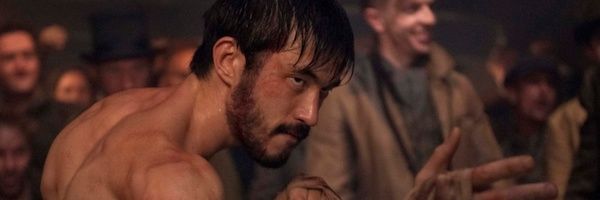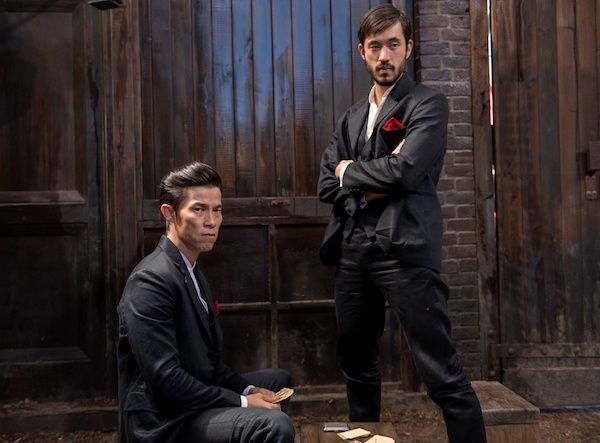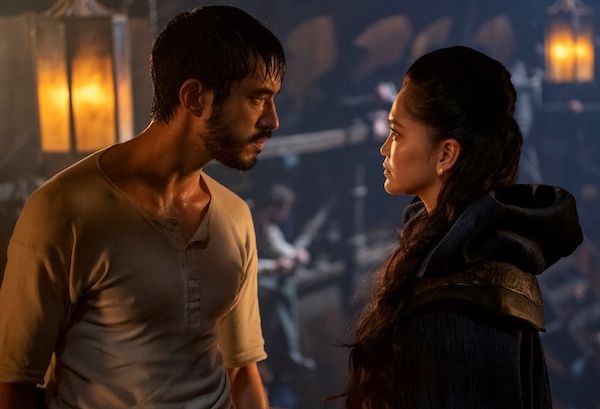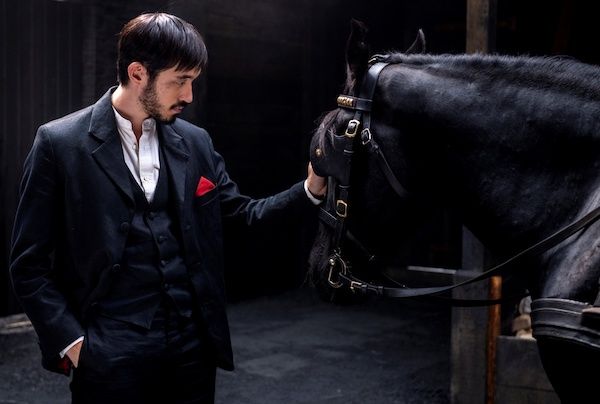From showrunner Jonathan Tropper and executive producers Shannon Lee (the daughter of Bruce Lee, who wrote the original treatment that inspired the series) and Justin Lin, the Cinemax drama series Warrior is an action-packed story set during the Tong Wars of San Francisco’s Chinatown in the late 19th century. The show follows Ah Sahm (Andrew Koji), who emigrates from China and tries to find his place in a new country while making a name for himself. Warrior's second season sees tests the martial arts prodigy as he figures out just how far you can push the bonds of family, both blood and chosen, before they snap.
During this 1-on-1 phone interview with Collider, Koji talked about the challenges of long-form television, what he most enjoyed about the story arc of Season 2, the complicated family dynamic, how he feels about where they leave things in Season 2, and that he hopes they’ll be able to continue the story in some way. He also talked about what made him decide to take on the role of Storm Shadow in Snake Eyes: G.I. Joe Origins and why accurate representation is important.
COLLIDER: I was so anxious for Warrior to return. How does it feel to actually be able to talk about Season 2?
ANDREW KOJI: It’s strange. When we were making it, it felt like we were doing something special, so to sit on it for awhile, it’s like, “Oh, that was me awhile ago. I can do better now, I swear.” I know that we did something special, and we were all hitting the notes and creating something. With most jobs, I’m cringing for the release, but this one, I’m genuinely excited for because I think we did something really good, even to my tastes.
Since you’re someone who is critical of yourself and your performance, what was it like to return to this character? How did it feel to be able to build on the character?
KOJI: In acting class, you hear about these legendary people who might have done the same role for 20 years and that, after 20 years, that’s when they feel they started to crack the role. You talk to someone like Hoon Lee, who’s such a clever actor. He’s very different. I’m more instinctual. I learned so much from him. He told me, early on, “You’re never gonna feel like you’ve cracked this character. It’s always gonna be evolving. You’re always gonna feel like you could do better and you could find it better.” I didn’t believe him, at first, and I was like, “No, it’s out there.” But then, I found myself going, “I can do better than that. I know I can.” It’s a nice feeling to know that I had another shot. Season 1, for me, was a lot about figuring out how to be more than a guest actor. When you’re in the position of the guest actor, you don’t have a voice and you’re not part of a team. You just go and do your job. With this, they trusted me and let me tweak things, here and there, and pushed me more, in different moments. For me, from an actor’s perspective, it felt like the backstory mattered. I had the most in-depth experience of backstory ever, and then I could take that and progress it from there. It’s a challenge when you’re on a longform TV show.
In the first season of the show, your character really felt like he was trying to find his footing and figure out this world that he found himself in. In the second season, he feels much more focused on the mission that he’s set for himself. What did you enjoy about the story arc of Season 2?
KOJI: During Season 1, reading the scripts, once he comes and finds his sister in Episode 1 and she doesn’t want him, his whole motivation is changed and he’s a bit lost after that because his main plan didn’t go through. For me, Season 1 is like the first act of a Western, when the stranger character comes to town and learns about the problems and the plight of the people in the town and they’re getting accustomed to everything that’s going on. Then, in the second act of the story, they get more involved with the town before they ride off into the sunset. So, this is Act 2. This is when he knows the rules of the game, he knows what’s going on, he knows the people, and he knows who to trust, which is pretty much no one. Now, he’s pushed into the story and he’s definitely more active, as the protagonist archetype where he’s making changes and trying to drive the action forward because he knows what’s going on and he knows what he wants. It’s different, in that way.
What did you enjoy about how Ah Sahm’s journey parallels with Mai Ling’s journey?
KOJI: I love working with Dianne [Doan]. She’s so great. Our schedules were very different, so we weren’t too involved in each other’s arcs until we were in scenes together. She’d go on with her mission while I was on my mission, and Jonathan [Tropper] and the writers were the puppet masters, making us go on our own journeys. And then, when we were together, I’d bring all of the scenes that I’d been through and she’d bring all of the scenes that she’d been through, and it would just slide right in. One of the scenes broke my heart a little bit because I love Dianne so much. She’s like a sister to me, so I find it out hard to wage war with her.
It certainly seems like a dynamic that would be hard to mend and repair when one person actually tried to kill the other one.
KOJI: For Ah Sahm, because he’s a hothead, there’s no going back for him, at least for now. In Season 1, he was just biding time until he got another chance to save his sister. But when that happened, she truly was a different person to him. I never asked Dianne what her backstory was, and she would never tell me, but for Ah Sahm, there’s no going back. She almost okayed his execution. If he can’t take her home, like he feels like he should, he’s going to tear down everything.
How do you feel about the way things are left by the end of the second season? If that’s the end of the series, how do you think fans will feel about it?
KOJI: As creatives, we take each jump as it might be our last. Until a TV show is on its third or fourth season, it’s never certain to go ahead. I don’t know all of those things but that’s what I’ve heard. People may want more. I know it got wrapped up in all of the technical outside circumstances with what’s happened with Cinemax but I think they’ll get some resolutions. If there’s an outcry, maybe we’ll be able to do more. One of my career goals is to Deadwood this. That show was done and they brought it back for a finale. That’s our goal — if there is an outcry. Hopefully, we’ll be able to continue. I really hope that they like this season because I think we made something special.
What has being a part of this show, telling this story, playing this character, and bringing this level of visibility, alongside this cast and crew, meant to you?
KOJI: On a personal level, it’s absolutely turned my life around. I was thinking of quitting. I don’t watch or look at any PR stuff nowadays but when it comes to Warrior, there was magic there. We were helping this legend Bruce Lee put out this piece of work and help create and make that vision, in telling a story about a subset of society, at the time, that is mostly unheard of and hasn’t had a chance to have a light shone on it. And then, the representation was great, with these interesting and colorful characters. I think it meant something to everyone, as actors. On a personal level, for me, [Warrior] absolutely changed my life. Without me even being in Hollywood, I was very jaded and skeptical of Hollywood. I was like, “I don’t wanna do that. I’m gonna create my own films and my own art. If I can only make a film every now and again, I’m not gonna sacrifice my artistic desire.” To be able to work with other people who are on the same page and who value my voice and my opinion and who want to turn out something good, that was just something I wanna do more of. It changed my outlook and my perspective on people, completely, and it gave me hope in this world. It just changed my life.
You also took things one step further by playing a character in a G.I. Joe movie, Snake Eyes: G.I. Joe Origins, playing Storm Shadow. What made you want to take on that character and how were you able to also tie in that character’s cultural authenticity as part of the role?
KOJI: Oh, that was a big one. I thought about playing that character because I didn’t like the first two films. I can say that. I’m allowed to not like a film. So, I was hesitant, at first, to even accept that. That’s a big studio film and my first role in a big studio film, so I was very hesitant because I didn’t have that trust in Hollywood to do that. What Warrior taught me and the voice that it gave me helped my work on Storm Shadow. I don’t wanna play a character with a six-pack. I wanted him to be human and flawed, and he’s going through stuff. For me, when I saw the first G.I. Joe films, I was like, “I don’t wanna do that. That’s not the kind of thing I wanna do.” So, when I spoke with the director (Robert Schwentke) about that I said, “If I’m gonna play him, I have to do my research into Japanese culture and embrace that.” There was an opportunity for me to do a performance in that kind of film for the next generation. My time in this business might end in a few years but a kid growing up might be able to watch that film and see a more realistic, grounded portrayal and feel like they can act and they can do this. Even if it’s in ninja form, they can still bring their own humanity to it. So, it was quite a deep thing for me, just because I had a lot of reservations about it, at first, but then they allowed me to do that. I’ve gotta give credit to those guys but that was all because of the skill I got from Warrior.
Warrior airs on Friday nights on Cinemax and is available on-demand.
Christina Radish is a Senior Reporter of Film, TV, and Theme Parks for Collider. You can follow her on Twitter @ChristinaRadish.




